On June 8, 2025, we celebrate World Oceans Day under the theme: "Wonder: Sustaining what sustains us.” This day serves as a profound reminder of humanity’s deep connection to the ocean and a call to action driven by curiosity, wisdom, and a collective commitment to global well-being. Yet, how much do we truly know about the vast, life-nurturing ocean - especially its mysterious and largely unexplored deep-sea regions?
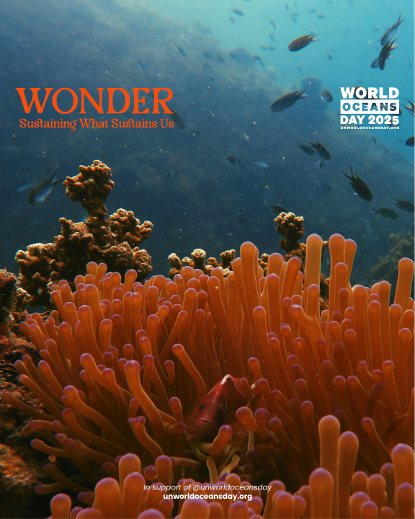
The deep ocean, defined as depths beyond 200 meters, makes up roughly 95% of the ocean’s volume - or more than 65% of Earth’s surface. Despite its vast expanse, it remains one of the least explored areas on the planet. This extreme environment is marked by crushing pressure (up to 110 MPa), freezing temperatures (1 to 4 °C), complete darkness, and a scarcity of organic material. Yet, remarkably, it is home to an astonishing range of life - from microbes to amphipods to fishes - whose unique genetic and metabolic adaptations offer a glimpse into the limits of life itself.
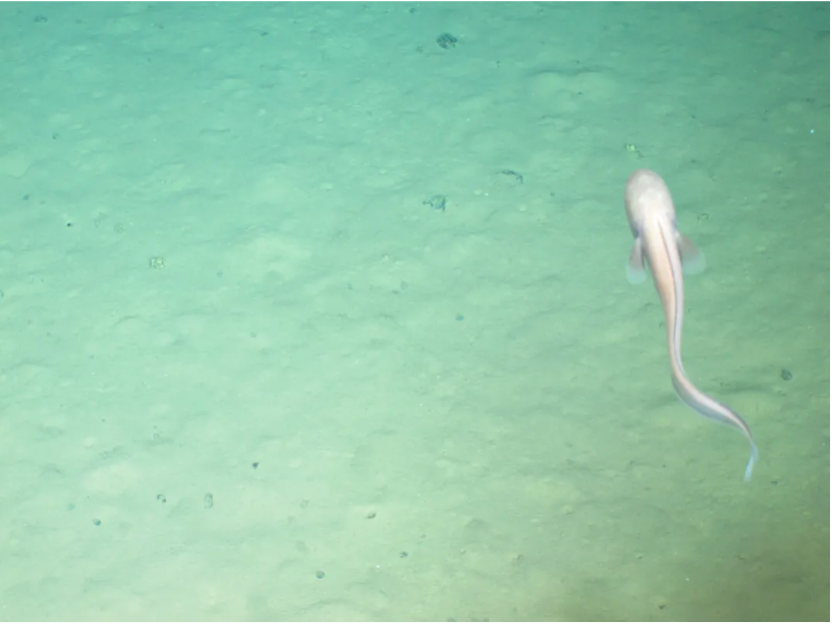 A fish observed swimming in the deep sea during a deep-dive exploration.
A fish observed swimming in the deep sea during a deep-dive exploration.
To unlock the secrets of these enigmatic ecosystems, BGI Group partnered with the Institute of Deep-sea Science and Engineering (IDSSE) of the Chinese Academy of Sciences, Shanghai Jiao Tong University, and other Chinese research institutions to launch the Mariana Trench Environment and Ecology Research (MEER) Project. This ambitious initiative represents BGI’s most significant marine research expedition to date.
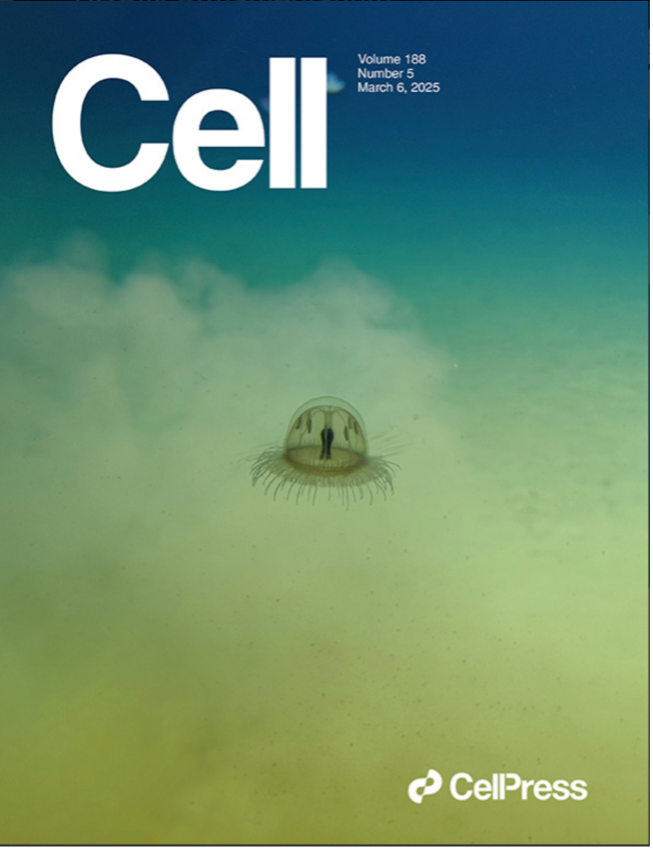 On March 6, 2025, Cell published a set of articles - including one commentary and three research papers - reporting the latest findings from the Mariana Trench Environment and Ecology Research (MEER) Project. This collection was featured as a cover story in the Volume 188 Issue 5 of Cell.
On March 6, 2025, Cell published a set of articles - including one commentary and three research papers - reporting the latest findings from the Mariana Trench Environment and Ecology Research (MEER) Project. This collection was featured as a cover story in the Volume 188 Issue 5 of Cell.
The project’s expedition was both historic and challenging: after 53 days at sea, braving Category 13 storms and enduring physical fatigue, the team finally reached their destination to begin an unprecedented scientific mission.
Over the course of the expedition, the team collected hadal trench microbial samples from approximately 1,700 sediment samples, 12 in situ seawater filtrates, and numerous macroorganism specimens. These samples were collected from depths ranging between 6,000 and 10,900 meters in the Mariana Trench, Yap Trench, and the Philippine Basin.
The MEER Project yielded groundbreaking insights into how abyssal organisms adapt to extreme conditions. Researchers identified remarkable “convergent adaptation” strategies shared between microbes and representative animals. These adaptations, shaped by the deep-sea environment, transcend species boundaries and provide a window into life’s resilience in the harshest conditions.
One of the key achievements of the project was the creation of the largest and most comprehensive hadal microbial metagenome dataset. This dataset revealed an extraordinary diversity of microorganisms, including over 7,564 newly identified species-level genomes - nearly 90% of which had not been previously documented in public databases.
Furthermore, the team discovered that the genome of a deep-sea amphipod spans an astonishing 13.92 Gb - more than four times the size of the human genome - highlighting its remarkable adaptations to extreme pressure and cold.
The researchers also studied 11 species of deep-sea fish, uncovering extraordinary genetic adaptations that enable them to thrive in the crushing depths. A key discovery found that many deep-sea fish species below 3,000 meters have undergone a unique genetic transformation in the rtf1 gene, which may be the key to maintaining stable gene expression under extreme pressure.
BGI Group played an instrumental role in the MEER Project, utilizing its high-throughput sequencing platform and spatiotemporal omics technologies to analyze samples from the trench. These efforts provided valuable insights into biodiversity, adaptation, and the biosynthetic potential of deep-sea life.
Notably, Wang Jian, Co-founder and Chairman of BGI Group, personally participated in the expedition, becoming the first Chinese scientist to conduct scientific research at the North Pole, the South Pole, the summit of Mount Everest, and the deepest point in Earth’s oceans.
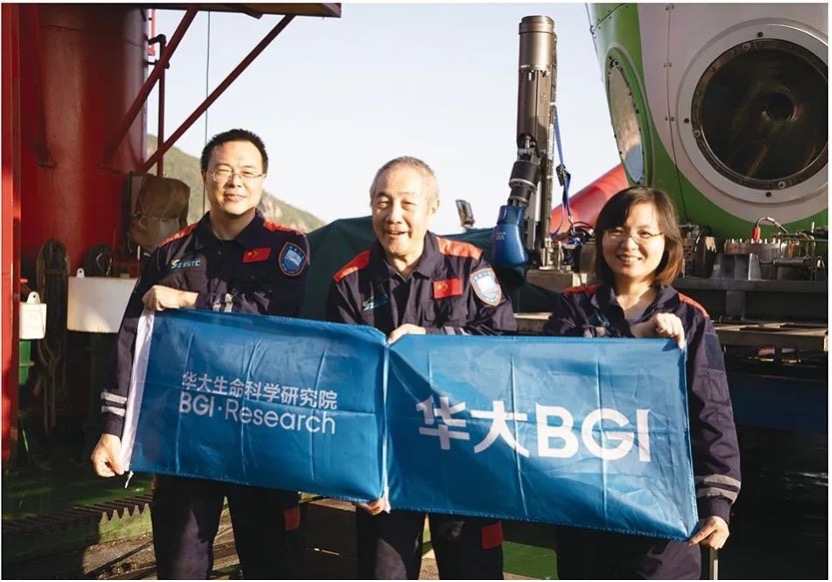 Group photo of Wang Jian (middle), Co-founder and Chairman of BGI Group, alongside BGI Group researchers Xu Xun and Liu Shanshan aboard the exploration vessel.
Group photo of Wang Jian (middle), Co-founder and Chairman of BGI Group, alongside BGI Group researchers Xu Xun and Liu Shanshan aboard the exploration vessel.
Beyond the MEER Project, BGI has spearheaded numerous other marine research initiatives aimed at deepening our understanding of the ocean and its resources. These efforts are driven by a vision of better protecting and sustainably managing marine ecosystems.
For instance, BGI and its collaborators developed the most comprehensive global marine microbiome database at the time. Another landmark study focused on sequencing the genome of Antarctic krill, which was featured as a cover story in Cell. Using genomic sequencing data, researchers analyzed the molecular mechanisms underlying key traits of Antarctic krill, such as growth, reproduction, energy metabolism, and genetic adaptations to extreme environments. This research not only provides a theoretical foundation for future studies but also helps guide the sustainable management of krill habitats and the ecosystems that depend on them.
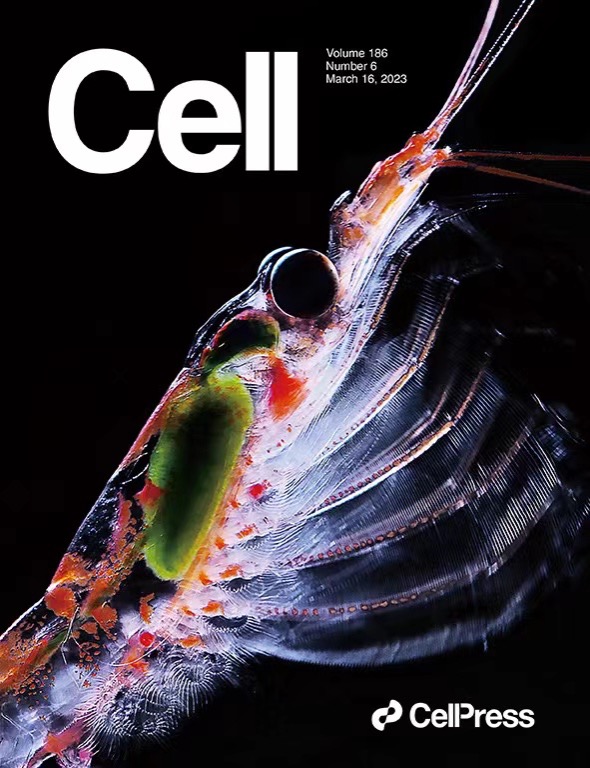 The enormous repetitive Antarctic krill genome reveals environmental adaptations and population insights, published as a cover story in Cell.
The enormous repetitive Antarctic krill genome reveals environmental adaptations and population insights, published as a cover story in Cell.
By analyzing the genomes of all living and recently extinct penguin species, alongside the morphology of long-extinct species, BGI researchers and partners have reconstructed over 60 million years of evolutionary history, aquatic ecology, and population dynamics of these highly specialized seabirds. This research is part of the international Bird Genome 10K (B10K) project, which aims to sequence the genomes of all extant bird species. The completion of genome sequencing for all penguin species - one of the 41 orders of modern birds - marks a significant milestone in achieving the ambitious goals of the B10K project.
As we reflect on World Oceans Day, it becomes clear that scientific exploration is not just about discovery - it is also about responsibility. From the hadal depths of the Mariana Trench to the genomic secrets of marine life, every advancement strengthens our collective ability to protect what sustains us. BGI Group remains steadfast in its commitment to uncovering the ocean's mysteries, ensuring that through understanding, we pave the way for a healthier and more sustainable future for generations to come.



